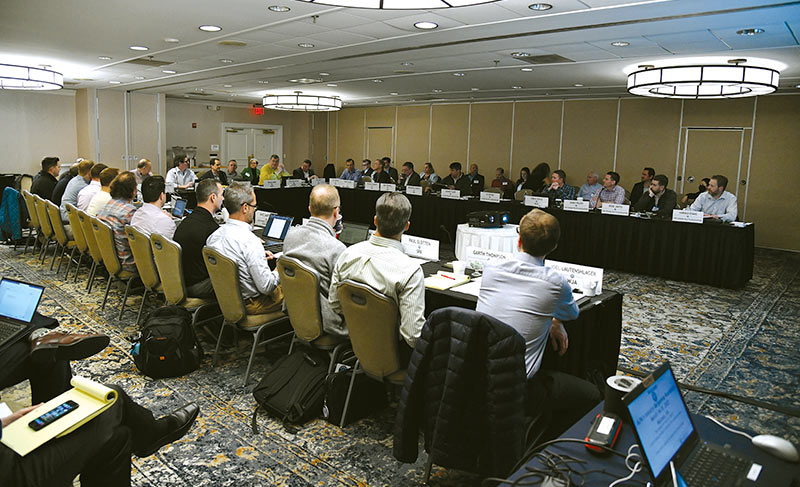Pilot Negotiators Discuss Successes, Trends, and Challenges at Bargaining Roundtable
By John Perkinson, Senior Staff Writer

ALPA holds its Industry Bargaining Roundtable to discuss recent collective bargaining trends.
Two dozen ALPA pilot negotiators from major, all-cargo, and low-cost airlines assembled March 14–15 near the Association’s offices in McLean, Va., for the union’s Industry Bargaining Roundtable. Joining these pilots and ALPA professional staff were pilot negotiators from the Air Canada Pilots Association and the Southwest Airlines Pilots Association. The group deliberated on recent aviation collective bargaining trends as well as innovative approaches to take advantage of current opportunities, resolve negotiating challenges, and focus on future negotiations.
“We’ve made some remarkable progress at the bargaining table recently,” said Capt. Jason Ambrosi, ALPA’s president, who stressed that for pilot groups to continue building on current successes, “coordination is key.” During his opening remarks, Ambrosi acknowledged recent contract gains secured at carriers including Alaska, Delta, Hawaiian, JetBlue, and Spirit. He also highlighted the need for the Association and other pilot groups to support those currently engaged in negotiations to continue raising the bar for the profession.
Capt. Jeff Harbison (JetBlue), ALPA’s Collective Bargaining Committee (CBC) chair, welcomed the roundtable participants, noting, “It’s good to be back in person.” He observed that while the CBC held several virtual events during the pandemic, the last time the committee hosted an in-person conference was in 2018. In addition to providing an overview of the event, Harbison encouraged attendees to network with their peers during breaks. “Building these kinds of relationships is invaluable,” he said, indicating that these pilots can serve as future resources.
Much of the meeting agenda featured facilitated group discussions, examining topics related to specific aspects of recent pilot negotiations and associated issues that have surfaced. Participants talked about the limitations of 401(k)s for some pilot groups and the use of market-based cash balance plans (MBCBP) to apply a more holistic approach to pilot retirement savings. MBCBPs offer a performance-based return on plan assets, as compared to traditional cash balance plans, which generally offer a fixed-interest credit rate. In addition, these plans’ IRS contribution limits are higher than those associated with 401(k) plans.
Participants discussed the evolution of reduced-crew operations on the flight deck—with special attention given to extended minimum-crew operations and single-pilot operations. Senior staff from ALPA’s Engineering & Air Safety Department briefed the group on recent developments, including research efforts by Airbus and other aircraft manufacturers to facilitate what could become reduced-crew or single-pilot operations. While existing technology doesn’t allow for the practical use of these applications, several ALPA pilot groups have secured contract language requiring at least two pilots on the airline flight deck as an added safety measure.
Attendees explored the value of developing strategic plans to enhance member support for contract negotiations, developing strategies to ensure pilots remain engaged, educated, and informed throughout the process. The group reviewed different kinds of unity-building exercises and cited the importance of ongoing polling to assess member interests and priorities as well as identify changing attitudes.
Several ALPA pilot groups recently applied a targeted approach to bargaining, particularly in the circumstance in which two airlines are preparing to merge. The pilots acknowledged that the merger process can be lengthy and that targeted negotiations can serve as an expedited way to address more immediate member needs.
Participants also discussed means to ensure that pilot contracts remain competitive and ensure that pilot groups receive the benefits of ALPA’s negotiations. Negotiators discussed the use of “snap up” provisions to help bring pay in line with subsequent contract gains achieved by pilots at other carriers and reinforce the practice of pattern bargaining. Similarly, other pilot groups have negotiated penalties to prevent instances when management’s implementation of new programs and services secured in recent negotiations become unnecessarily delayed or when management has failed to adhere to an important negotiated provision.
Attendees also reviewed the role the National Mediation Board can play in negotiations, including the need to time any application to the board after other strategies are exhausted as the process is lengthy and accedes a level of control to the governmental party.
The two-day conference featured property updates from pilot negotiators, allowing participants to ask questions and compare experiences. In addition, Kye Johanning, the director of ALPA’s Economic & Financial Analysis Department, presented a financial forecast for the North American airline industry. Among his many observations, he noted that last year the FAA issued 9,491 new ATP MELs (i.e., certificates required to fly as pilots for Part 121 airlines), far exceeding the approximately 6,400 aviators that Boeing projected the North American airline industry would need annually over the next 20 years.
Harbison moderated this year’s bargaining roundtable together with Andrew Shostack, director of ALPA’s Representation Department. Additional CBC events are slated for later this year.

